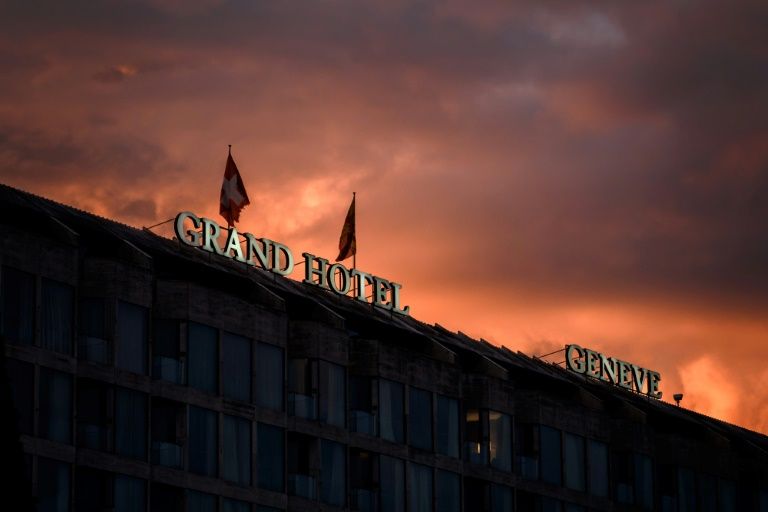Luxury Geneva hotels face ‘life-threatening’ corona crunch
Geneva (AFP) – Behind its deep-red awnings, Richemont’s blinds have been closed since July, after the coronavirus pandemic left the usually bustling five-star Geneva hotel starved for high-paying customers.
Now, after a “catastrophic” summer, other luxury lodgings in the Swiss city — which boasts the highest hotel density in the world — are struggling to avoid the same fate.
“We are in a profession that is truly in intensive care, and the condition is life-threatening,” a stoney-faced Thierry Lavalley, who heads the Geneva hotel association and runs the five-star Fairmont Grand Hotel, told AFP.
Before the pandemic hit, hotels in the city — a hub for diplomatic and international business activity — had been surfing on a wave of growth, with 3.2 million night stays annually for the past two years.
The sector was then struck by an “economic tsunami”, Lavalley said.
Switzerland, which has counted 50,000 coronavirus cases and nearly 1,800 deaths, dodged strict confinement measures seen in neighbouring countries.
But travel restrictions, event cancellations and months-long closures of restaurants and museums have taken a serious toll.
By the end of July, Geneva hotels had booked just 693,000 night stays and they expect no more than 1.3 million by the end of the year.
That level was last seen in 1954, when the city counted half as many hotels as it does today.
– ‘Hardest hit’ –
The hotel crisis is being felt across Europe, but the situation is particularly critical in Geneva, where the clientele is largely comprised of international business travellers and diplomats.
Individual clients coming for recreational tourism generally account for just a quarter of the total, Adrien Genier, head of the Geneva Tourism, told reporters recently.
The remaining three-quarters are booked for people attending business congresses and seminars, or clients connected with large summits and meetings hosted by the United Nations and other international organisations.
But now, “there are no more congresses, no more business tourism, and the UN is barely moving. That makes Geneva the hardest-hit city in Switzerland,” Lavalley said.
During the first seven months of the year, Geneva hotels saw night stays shrink by 63 percent compared with the same period last year, and the full-year number is expected to be 75 percent lower, he said.
With its 126 hotels and 10,000 rooms, Lavalley says Geneva has one of the world’s highest hotel density — a measure of the number of hotel rooms compared to the number of inhabitants.
If nothing is done to fix the situation, the sector “will be heavily impacted by closures and bankruptcies,” Lavalley said, warning that many more risked ending up like Richemont, which was forced to close after 145 years in business.
– ‘Bottom of the pit’ –
Meanwhile, neighbouring towns that usually profit from their proximity to Geneva are suffering as well.
In Lausanne, around 60 kilometres (37 miles) further down the shores of Lake Geneva, one establishment at least is preparing to close next month, Stefano Brunetti-Imfeld, head of that city’s hotel association, told AFP.
Lausanne is home to more than 50 international sporting federations, as well as the headquarters of the International Olympic Committee (IOC), and it is suffering from a slowdown of its own.
“All of those people are staying home, not coming to work, are barred from travelling or from bringing people in,” said Brunetti-Imfeld, whose family has run the Hotel de La Paix in downtown Lausanne since 1954.
Amid this “completely unprecedented situation”, hotel owners in Geneva and surrounding areas have pleaded with Switzerland’s federal government and regional authorities to create a fund to help cover their losses and allow them to stay afloat until things turn around.
They have also urged authorities to seek a better balance between health and economic interests.
Each restriction and each limitation has an “immediate and devastating” impact on hotel stays, Brunetti-Imfeld said, pointing for instance to Switzerland’s recent decision to place much of France, including Paris, on its red list, requiring any travellers from there to quarantine.
Lavalley meanwhile insisted that finding “middle-ground” between health and economic interests was needed “to allow us to climb up from the bottom of this pit”.
Disclaimer: Validity of the above story is for 7 Days from original date of publishing. Source: AFP.


